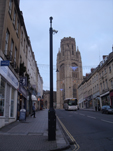Bristol City Council received 2,500 reports of anti-social behaviour (ASB) by its tenants in 2011/12, new figures released by the authority have shown. Some 93 per cent of these were resolved through early intervention and informal action with just 88 serious cases being referred to the ASB team. Of these 20 cases were the subject of Anti-Social Behaviour Orders (ASBOs), 31 injunctions for ASB, 9 led to evictions, three resulted in Crack House Closure Orders and 11 in Demotion Orders or possession action.
A demoted tenancy removes a number of tenancy rights, lowers security of tenure and makes it easier for a landlord to seek re-possession or evict a tenant if they do not improve their behaviour.
To put in place a demoted tenancy a landlord must obtain a court order which allows them to reduce an existing secure tenancy to a ‘demoted’ one. This lasts for 12 months.
Re-possession of a council tenancy may be sought by a local authority when all other attempts to resolve breach of tenancy conditions have been exhausted. In order to secure possession a council will need a court order.
In addition, 30 cases were referred to Family Intervention Project which works with households at risk of eviction because of ASB-related problems.
Councillor Anthony Negus, Cabinet Member for Housing, Property and Regeneration, said: “Anti-social behaviour can seriously damage the quality of life for residents and have a major negative effect on local neighbourhoods.
“Tackling the problem is a key priority for us and we employ a range of tools and powers in order to intervene and resolve any problems as swiftly as possible. Our approach is to respond to all complaints involving a council tenant or their visitors, whether they are a victim or perpetrator, within three working days and agree an action plan within 10 working days of a report.
“However, we will respond to urgent cases within a day. Feedback gathered since May this year has shown a significant improvement in tenant satisfaction about how their case was dealt with compared to previous years.
“But we are working to improve our current performance in order to be even more effective in the way we tackle all anti-social behaviour in our tenancies.
“To do this, we need people who are experiencing anti-social behaviour to report it to us and to help us gather the evidence needed for us to take action.
“One person committing ASB can have a disproportionately large effect on the lives of a community and that is why we need to tackle it as soon as we can.”
Harassment/intimidation and noise continued to be the most common complaints by tenants.
As well as the above action the council also interviewed 1,546 tenants, sent 1,149 letters, agreed 46 Acceptable Behaviour Contracts and made 70 referrals to Bristol Mediation Service.
There are 13 multi-agency operational meetings across the city attended by members of Avon and Somerset Police, Safer Bristol, the council’s Estate Management team and other agencies as required which assess and plan joint actions regarding ASB in the area covered.
Where the ASB is serious and any informal action to resolve this has failed, the case is taken to a Formal ASB Case Conference where decisions are taken based on all evidence available. Present at the Case Conference are a number of agencies including a legal advisor. At this conference an agreement is made on the level of sanction to be applied and the support needed for victims.
Meanwhile city police gained a two-month crack house closure order on a flat in Baynton House in Lawrence Hill. The flat was the home of a 76-year-old-man. ASB Coordinator Alex Quayle said: “We’re particularly pleased that we managed to gain a crack house closure on this property because Baynton House is a warden-controlled block and many of the residents are are elderly and vulnerable.”
“We don’t take the decision lightly to deprive an elderly man of his home but we had spoken to the tenant of the flat on several occasions but problems continued and something had to be done to protect the other residents.”
Residents complained of streams of visitors to the flat at all times of night and day making them feel vulnerable and intimidated. The worst occasion being where eight people visited the flat between 2.30 and 3.30am.
Beat Manager PC Farzana Risdale said: “We hope that this crack house closure sends a strong message to criminals. We won’t tolerate people who are making lives miserable for their neighbours. We will be relentless in resolving the issues that are affecting communities.”
“The closure of this house will have a really positive impact on the community, and will bring relief to the long-suffering neighbours. We hope that this action will give the community confidence in the Police’s ongoing efforts to tackle drugs and anti-social behaviour.”










